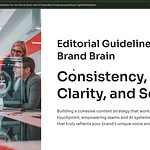For marketers, nothing hits that dopamine center like immediate, measurable results. With traditional SEO, success emerges slowly, often painstakingly. But with Chat Search Optimization (CSO) for ChatGPT, one day you're invisible and the next you're the top recommendation.
This change excites (and terrifies) content strategists everywhere, including me. As Head of Content Strategy at Copy.ai, I’ve seen AI reshape content discovery firsthand. But here's a crucial truth: what works for ChatGPT doesn’t automatically translate to other AI platforms. Each system—Gemini, Perplexity, Claude—operates with unique mechanics, rendering universal strategies an overpromise that they won’t be able to deliver on.
In this article, I share our lessons from pioneering Chat Search Optimization, exploring its genuine promise and clarifying its critical limitations.
Chat Search Optimization: What We've Learned (and What We're Still Discovering)
Our experiments at Copy.ai have given some cool outcomes. For example, in March, ChatGPT drove over 150 demo requests, directly translating into tangible business impact. But despite similar efforts, platforms like Gemini and Perplexity showed only muted engagement.
Why such disparity? Simple: I believe that AI platforms differ fundamentally, and we’ve only optimized for ChatSearch.
Each employs its own retrieval algorithms, training datasets, and user experience nuances. Therefore, marketers claiming to master universal "AI Optimization"—or AEO—often oversimplify a deeply complex reality. Real optimization demands constant learning, rigorous testing, and platform-specific strategies.
How Copy.ai Approaches Chat Search Optimization
My journey began spontaneously, inspired by a technical article at an airport. That moment evolved into a comprehensive guide to appearing in ChatGPT's search results. Partnering closely with our contacts at OpenAI, we built a strategic, dual approach combining traditional SEO techniques with dedicated Chat Search methods.
You can find the full article here.
Our process looks something like this:
We audit existing content, assessing potential for both traditional search engines and chat-driven AI queries.
We craft FAQs specifically for conversational chat experiences, using natural language queries paired with semantically rich responses.
Sometimes, we create separate content pieces for traditional SEO versus chat optimization, refining each to match the specific user experience and intent.
This balanced strategy has already produced compelling early results, though the learning curve remains steep and ongoing.
Why Platform-Specific Matters
There's a flawed notion circulating among marketers: that one optimized strategy can conquer all AI platforms equally. I still think it’s too early days to tell, though. I could be wrong.
I suspect, though, that just as traditional search engines—Google, Bing, YouTube—require tailored strategies, AI platforms follow the same principle, with even greater variability. ChatGPT, Gemini, and Claude possess distinct training sets, response patterns, and engagement behaviors.
In the same way Google delivers dynamic content based on user history and location, I wonder the degree to which our interactions with a copilot change the products it recommends.
In other words, these systems might be harder to “game,” and that might be a good thing. Maybe we’ll need to get back to just answering customer questions and solving customer problems. Wouldn’t that be a world?
It’s Time to Embrace Experimentation
At Copy.ai, deliberate experimentation guides our strategy. We run controlled tests, measure rigorously, and iterate swiftly. Success hinges not on immediate mastery but continuous adaptation. Embrace uncertainty as you refine your methods.
Test hypotheses openly, measure outcomes transparently, and share discoveries generously within your community.
A Few Final Thoughts…
The rise of Chat Search Optimization offers tangible rewards for early optimizers. But nuances matter deeply. Reject oversimplified, universal solutions in favor of a nuanced, platform-specific approach. The most successful content teams experiment continuously, learn eagerly, and pivot confidently based on real-world results.
I'm eager to hear your experiences and insights. Share what’s working—and what isn't—as we collectively explore this exciting new frontier of content discovery.
Let's keep learning together.
— Nathan.ai









